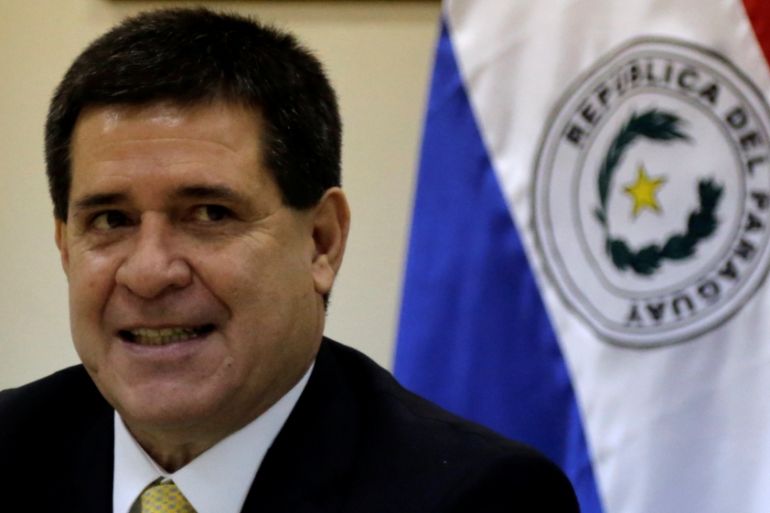Paraguay’s President Horacio Cartes offers resignation
Cartes presents his resignation to Congress so that he can legally take office as a senator on July 1.

Paraguay’s President Horacio Cartes has presented his resignation to Congress, in a move paving the way for him to legally take office as a senator.
Cartes’ term officially ends in August and if Congress accepts his resignation, Alicia Pucheta, a 68-year-old former Supreme Court judge who was recently named vice president, will run the country for the coming months – and also become the first woman in Paraguay to do so.
President-elect Mario Abdo Benitez, a member of Paraguay’s ruling Colorado Party and winner of an April 20 election, will take office on August 15.
“I present my letter of resignation as the president of the Republic of Paraguay to be able to continue serving my country in the Senate, fulfilling the people’s will expressed during the vote. May God bless Paraguay,” Cartes wrote in a Twitter post on Monday.
Cartes’ resignation had been expected since he was elected to the Senate in the April vote. The incoming senators are to be sworn in on June 30.
According to Paraguay’s constitution, former presidents automatically become senators for life. They can express opinions but cannot vote.
But Cartes, 61, will become a senator with full rights after running in the elections and winning a Senate seat, a post that will help him extend his political influence.
The Supreme Court ruled Cartes’ Senate bid was constitutional. Former President Nicanor Duarte tried to do the same in 2008 but the Congress blocked the move at an earlier stage.
|
|
The Congress will now vote on whether to accept Cartes’ resignation.
Twelve legislators have already presented a petition to debate it, with the Guasu Front, a left-wing electoral alliance presided over by former President Fernando Lugo, already announcing that it would oppose Cartes’ move.
Under Paraguay’s constitution, presidents can only serve one, five-year term.
In 2017, Cartes made a proposal to introduce constitutional amendments that would allow him to run for re-election. The move triggered violent riots, with hundreds of people injured and more than 200 arrested.
Cartes later stepped back as international and local pressure mounted against his bid.
During his five years in power, Paraguay enjoyed consistent economic growth, but failed to shake off persistent poverty, corruption and drug trafficking.
Despite an official campaign against endemic corruption, Paraguay remains 135th out of 180 countries on the 2017 corruption index of Transparency International.
|
|